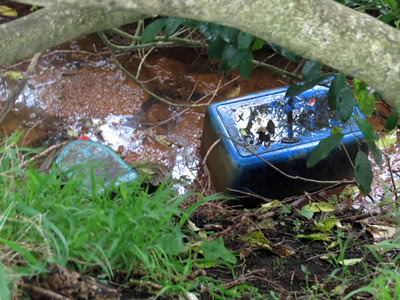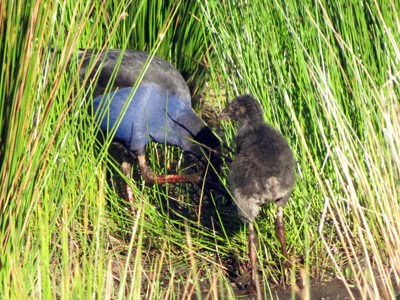Welcome to the Midnight Collective Broadsheet 147
Actively
supporting NZ’s endangered wetland birds
 |
| Still mucky after all these weeks |
We
have taken a while to follow this up because we have been away on a jaunt.
However we pursued this pollution story with the Regional and District Councils
and here are the results; Regional Council first.
The
investigative officer sent our photographs to their science lab, who came back
to them (a week later) with a definitive judgement (from the photographs), that
this was a natural phenomena, a reaction of bacteria to ferrous iron, that sometimes
occurs in recently disturbed waterways. It was therefore not a pollutant issue.
We had also consulted the District Council who filed a similar story, having obviously
been in contact with them.
 |
| Naturally stagnant? - Is this now a permanent feature of our wetland? |
There
are issues around this that need to be brought out into the open. No-one from
either of these organisations carried out a site inspection, so no water
samples were taken to confirm the judgement. The Regional Council is based in
Wellington an hour away. This
travel time and expense seems now to be factored into their decision making. It also confirms that much of their work day is spent in the office talking to their
laptops. This has not gone unnoticed by people we have talked to on-site.
‘They’re all just academics,’ was one caustic response. None of this decision-making took into account the fact
that the pollution appeared to start around the dumped rubbish and oil cans, then
flush out into the wetland. The District Council said they would send someone
down to clean up this mess. A month later it still hasn’t happened.
 |
| Now you see it. |
 |
| Now you see it (Month later) |
We
have had above average rainfall over the last few weeks which should have
flushed the area but this ‘non-pollution’ is now spreading, leaving wider areas
stagnant.
The
NZTA is still working in the area, reinforcing the drainage banks, so the area
isn’t draining the way it was designed to; though, needless to say, none of
this shemozzle is filtering into the news media.
 |
| Wetland beside rebanked drain |
 |
| Putangitangi female left high and dry |
And
this work appears very ad hoc, drying up the wetland at a time when it is
usually at its peak. This is a worry for nesting birds like pukeko and pied
stilt which rely on the water to safeguard their nests and their youngsters.
Yet there seem very few nesting birds down here. We’ve spotted a couple of ducklings
and two pukeko chicks at a time when there are usually three or four broods of
both.
 |
| Mallard chick - all alone am I! |
 |
| Pukeko chick - all alone am I 2! |
No pied stilt so far and no paradise duck broods. Though a couple of spurwinged
plover pairs are skulking around (these self-introduced predators feed upon native eggs and chicks).
Coastal
wetland areas (pakihi) are notoriously difficult to define however, for they
change from season to season. And it is still early days in the life of this
one so let's finish on a positive note. Every year NZ holds a kereru count (these birds are
crucial for spreading large forest tree seeds). There are populations in the
Tararua forests around here but we have never seen them down on the coast, so
imagine our delight when for the first time one gate crashed our kowhai.
Here’s
the video
But what is going on? Tui numbers have
been up again this year and it’s possible that the tuis are dragging curious kereru
in their wake.
 |
| A kereru in a kowhai tree |
 |
| Tui - ditto repeato |
Kereru also feed on kowhai, but on leaves not flowers.
Another native bird that has been spotted locally though we haven’t seen her yet, is our endangered native falcon – karearea. And she may also be following
the tuis. One was apparently spotted chasing a tui away from a feed in a back
garden; though we need photographs to confirm this.
Track we were listening to while posting this - well it had to be, Halloween drawing ever closer on our luxurious spring parade
I was working in the lab late one night
When my eyes beheld an eerie sight
For my monster from his slab began to rise
And suddenly to my surprise
He did the mash
He did the monster mash
The monster mash
It was a graveyard smash
He did the mash
It caught on in a flash
He did the mash
He did the monster mash
with thanks to Bobby (Boris) Pickett from 1962...


No comments:
Post a Comment